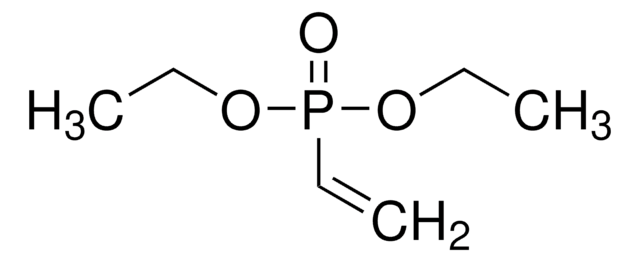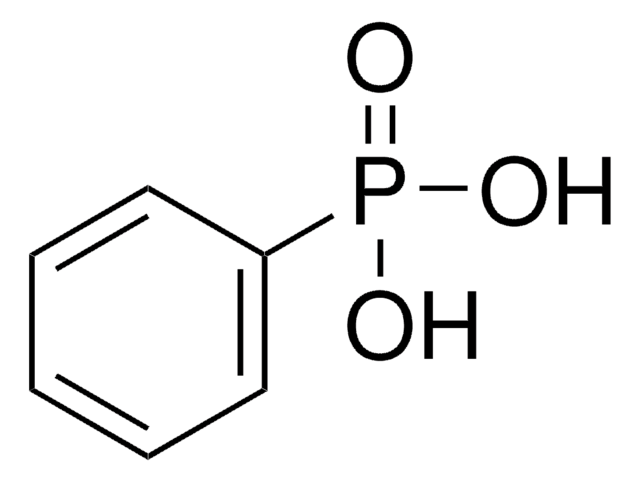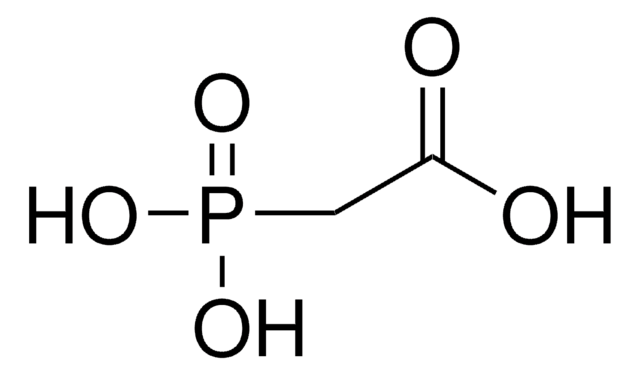672068
Vinylphosphonic acid
≥90% (T)
Synonym(s):
Ethenephosphonic acid, Ethylenephosphonic acid, P-Ethenylphosphonic acid
Sign Into View Organizational & Contract Pricing
All Photos(1)
About This Item
Linear Formula:
CH2=CHP(O)(OH)2
CAS Number:
Molecular Weight:
108.03
Beilstein:
1741622
EC Number:
MDL number:
UNSPSC Code:
12352100
PubChem Substance ID:
NACRES:
NA.22
Recommended Products
Quality Level
Assay
≥90% (T)
impurities
≤7.0% water
mp
36 °C (Lit. dry VPA) (lit.)
density
1.37 g/mL at 20 °C (lit.)
SMILES string
OP(O)(=O)C=C
InChI
1S/C2H5O3P/c1-2-6(3,4)5/h2H,1H2,(H2,3,4,5)
InChI key
ZTWTYVWXUKTLCP-UHFFFAOYSA-N
Looking for similar products? Visit Product Comparison Guide
Related Categories
Application
Vinylphosphonic acid (VPA) can be used as a monomer unit for the synthesis of poly(vinylphosphonic acid) via free radical polymerization. It is also used to develop copolymers of VPA with acrylonitrile, N-isopropylacrylamide, styrene, vinylpyrrolidone, and acrylic and methacrylic acid. These copolymers find potential application in hydrogels, drug delivery, biomimetic mineralization, and polymer electrolyte membranes in fuel cells.
It can also be used as an organic building block to prepare (E)-styryl phosphonic acid derivatives by reacting with various aryl halides via Pd-catalyzed Heck coupling reaction.
It can also be used as an organic building block to prepare (E)-styryl phosphonic acid derivatives by reacting with various aryl halides via Pd-catalyzed Heck coupling reaction.
Signal Word
Danger
Hazard Statements
Precautionary Statements
Hazard Classifications
Met. Corr. 1 - Skin Corr. 1B
Storage Class Code
8A - Combustible corrosive hazardous materials
WGK
WGK 1
Flash Point(F)
467.6 °F
Flash Point(C)
242 °C
Personal Protective Equipment
dust mask type N95 (US), Eyeshields, Gloves
Choose from one of the most recent versions:
Already Own This Product?
Find documentation for the products that you have recently purchased in the Document Library.
Customers Also Viewed
Single-step synthesis of styryl phosphonic acids via palladium-catalyzed Heck coupling of vinyl phosphonic acid with aryl halides
McNichols BW, et al.
Chemical Communications (Cambridge, England), 53(92), 12454-12456 (2017)
J W Nicholson et al.
Journal of oral rehabilitation, 30(2), 160-164 (2003-01-22)
A glass-ionomer cement containing an acrylic acid/vinyl phosphonic acid copolymer, has been investigated for its interaction with water and with aqueous lactic acid and the results compared with those from conventional glass-ionomers based on polyacrylic acid. Cylindrical specimens (12 mm
Ozlem Dogan et al.
Langmuir : the ACS journal of surfaces and colloids, 22(23), 9671-9675 (2006-11-01)
In the present work, copolymers of vinylphosphonic acid and 4-vinilyimidazole (poly(4-VIm-co-VPA)) were found to be substrates favoring the precipitation of nanohydroxyapatite (HAP) crystals from stable supersaturated solutions at pH 7.4 and 37 degrees C. Deposition kinetics were studied by the
J Kim et al.
Journal of dental research, 89(5), 482-487 (2010-03-05)
Continuous etching of aggressive all-in-one adhesives occurs in wet dentin tubules after polymerization of the adhesives. This study challenged the hypothesis that unpolymerized acidic monomers from an aggressive all-in-one self-etching adhesive continue to etch beyond dentin hybrid layers. Dentin surfaces
Li-Sha Gu et al.
Acta biomaterialia, 7(1), 268-277 (2010-08-07)
Immobilization of phosphoproteins on a collagen matrix is important for the induction of intrafibrillar apatite mineralization. Unlike phosphate esters, polyphosphonic acid has no reactive sites for covalent binding to collagen amine groups. Binding of poly(vinyl phosphonic acid) (PVPA), a biomimetic
Our team of scientists has experience in all areas of research including Life Science, Material Science, Chemical Synthesis, Chromatography, Analytical and many others.
Contact Technical Service



![Bis[2-(methacryloyloxy)ethyl] phosphate](/deepweb/assets/sigmaaldrich/product/structures/128/336/4e7a3e38-338c-423e-95b8-70d9d1f8e121/640/4e7a3e38-338c-423e-95b8-70d9d1f8e121.png)









